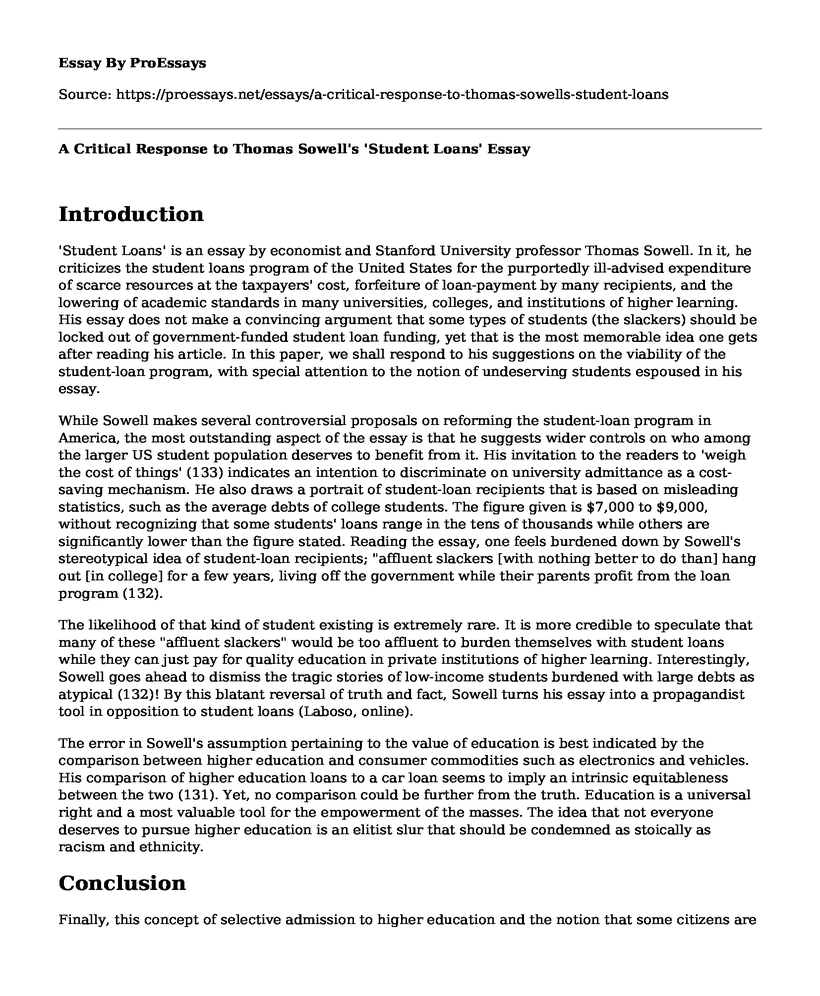Introduction
'Student Loans' is an essay by economist and Stanford University professor Thomas Sowell. In it, he criticizes the student loans program of the United States for the purportedly ill-advised expenditure of scarce resources at the taxpayers' cost, forfeiture of loan-payment by many recipients, and the lowering of academic standards in many universities, colleges, and institutions of higher learning. His essay does not make a convincing argument that some types of students (the slackers) should be locked out of government-funded student loan funding, yet that is the most memorable idea one gets after reading his article. In this paper, we shall respond to his suggestions on the viability of the student-loan program, with special attention to the notion of undeserving students espoused in his essay.
While Sowell makes several controversial proposals on reforming the student-loan program in America, the most outstanding aspect of the essay is that he suggests wider controls on who among the larger US student population deserves to benefit from it. His invitation to the readers to 'weigh the cost of things' (133) indicates an intention to discriminate on university admittance as a cost-saving mechanism. He also draws a portrait of student-loan recipients that is based on misleading statistics, such as the average debts of college students. The figure given is $7,000 to $9,000, without recognizing that some students' loans range in the tens of thousands while others are significantly lower than the figure stated. Reading the essay, one feels burdened down by Sowell's stereotypical idea of student-loan recipients; "affluent slackers [with nothing better to do than] hang out [in college] for a few years, living off the government while their parents profit from the loan program (132).
The likelihood of that kind of student existing is extremely rare. It is more credible to speculate that many of these "affluent slackers" would be too affluent to burden themselves with student loans while they can just pay for quality education in private institutions of higher learning. Interestingly, Sowell goes ahead to dismiss the tragic stories of low-income students burdened with large debts as atypical (132)! By this blatant reversal of truth and fact, Sowell turns his essay into a propagandist tool in opposition to student loans (Laboso, online).
The error in Sowell's assumption pertaining to the value of education is best indicated by the comparison between higher education and consumer commodities such as electronics and vehicles. His comparison of higher education loans to a car loan seems to imply an intrinsic equitableness between the two (131). Yet, no comparison could be further from the truth. Education is a universal right and a most valuable tool for the empowerment of the masses. The idea that not everyone deserves to pursue higher education is an elitist slur that should be condemned as stoically as racism and ethnicity.
Conclusion
Finally, this concept of selective admission to higher education and the notion that some citizens are not deserving of government support to get an education flies in the face of attaining enlightenment as a society. Even from an economic point of view, the cost of an uneducated public far outweighs that of the student loans program. Moreover, the student loans program takes up an insignificant portion of the budget in comparison to such expensive expenditures as defense and Medicare. While his essay covers areas such as declining educational standards, obtrusive government, and wastefulness sufficiently, he bungles the argument on the eligibility of students for the loans program.
Work Cited
Sowell, Thomas. "Student loans." is reality optional? and other essays. Stanford: Hoover, 1993. 131-33.
Laboso, Katie. Too poor to pay for college, too rich for financial aid. CNN Money.
Cite this page
A Critical Response to Thomas Sowell's 'Student Loans'. (2022, May 23). Retrieved from https://proessays.net/essays/a-critical-response-to-thomas-sowells-student-loans
If you are the original author of this essay and no longer wish to have it published on the ProEssays website, please click below to request its removal:
- Strategies in Teaching Content Area Learning, Vocabulary, and Math
- Critical Summary for "Fathers Are Parents, Too!" Paper Example
- My Goals and Motivations for Pursuing a Degree in Early Childhood Education - Essay Sample
- Essay Sample on Teaching Social Skills to Improve Education and Parenting
- Research Paper on Globalization: A Historical Perspective
- Paper Example on Social Inequality at California State University
- Communication for Child Growth - Free Research Paper Sample







